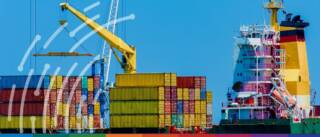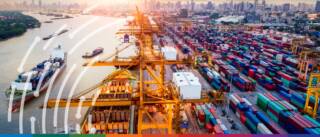Learn about Lloyds Bank’s collaboration with WaveBL and the benefits of digital trade documentation for global shipping and trade efficiency.
Letters of credit remain a core part of documentation in international trade. Despite the ease in cross-border payments facilitated by fintech companies, letters of credit continue to present themselves as indispensable documents in trade finance.
Get your import & export processes right by understanding the key elements of Incoterms, Ex Works (EXW), common mistakes & best practices.
Five industry associations have backed an electronic bill of lading (eBL) by declaring they will secure a commitment from stakeholders to collaborate on driving digitalisation. DCSA, BIMCO, the International Federation… read more →
At Sibos, the topic of trade digitalisation was buzzing with discussion. However, in order for the industry to make significant progress, it’s essential for all stakeholders to align their efforts. Pamela Mar, Managing Director of ICC Digital Standards Initiative (DSI), is at the forefront of addressing this issue.
For centuries, trade documentation has been a time-intensive and resource-demanding process, involving a multitude of stakeholders and a deluge of paperwork. Central to this process is the bill of lading, the most critical document in international trade.
Lloyds Bank has completed what it believes to be the first transaction under the UK’s new Electronic Trade Documents Act (ETDA) which came into force today [20 September 2023].
With the passing of the UK’s Electronic Trade Documents Act (ETDA), the digital trade world is changing. While this is welcomed news for the entire industry, it also means that new partnerships and innovations need to come to fruition.
Does a New York court have jurisdiction over an Indian collecting bank that is alleged to have violated the Uniform Rules for Collections (URC 522) for neither collecting and remitting funds to pay for shipments represented by the documents forwarded to it nor returning originals of several of the documents sent to it for collection?
The potential impact of the UK’s incoming Electronic Trade Documents Bill goes far beyond a boost to the country’s trade prospects. By enshrining in law that a digital document is equivalent to physical paper, the reform means that counterparties can issue and process documents electronically by default, – and with UK law acting as the basis for trade transactions across much of the world, the opportunity for transformation is unprecedented.
To successfully digitalise Bills of Lading, the three necessary foundations are law, standards and technology. Without their proper application, any eBL SaaS platform, notwithstanding the attractiveness of the business model, is unstable.
In international trade, shipping containers are vital for transporting goods safely and securely. To use them, however, many shipping lines require traders to put down deposits – known as container deposits – to safeguard against possible liabilities such as damage, demurrage, or total loss of the container.
Lloyds Bank and Enigio have formed a new long-term partnership to increase the use of digital documentation in trade finance through blockchain technology. With this partnership, Lloyds Bank and Enigio… read more →
Nine ocean carriers recently committed to 100% adoption of an electronic bill of lading (eBL) by 2030, with a waypoint goal of 50% adoption within five years. It is a significant step along the road to digitalisation, one that heralds a future for container trade processes that are simpler, more sustainable and more resilient.
Today the Digital Container Shipping Association (DCSA) announced a commitment for its members to transition from paper bills of lading to electronic bills of lading by 2030. The switch is… read more →
 Australia
Australia Hong Kong
Hong Kong Japan
Japan Singapore
Singapore United Arab Emirates
United Arab Emirates United States
United States France
France Germany
Germany Ireland
Ireland Netherlands
Netherlands United Kingdom
United Kingdom















